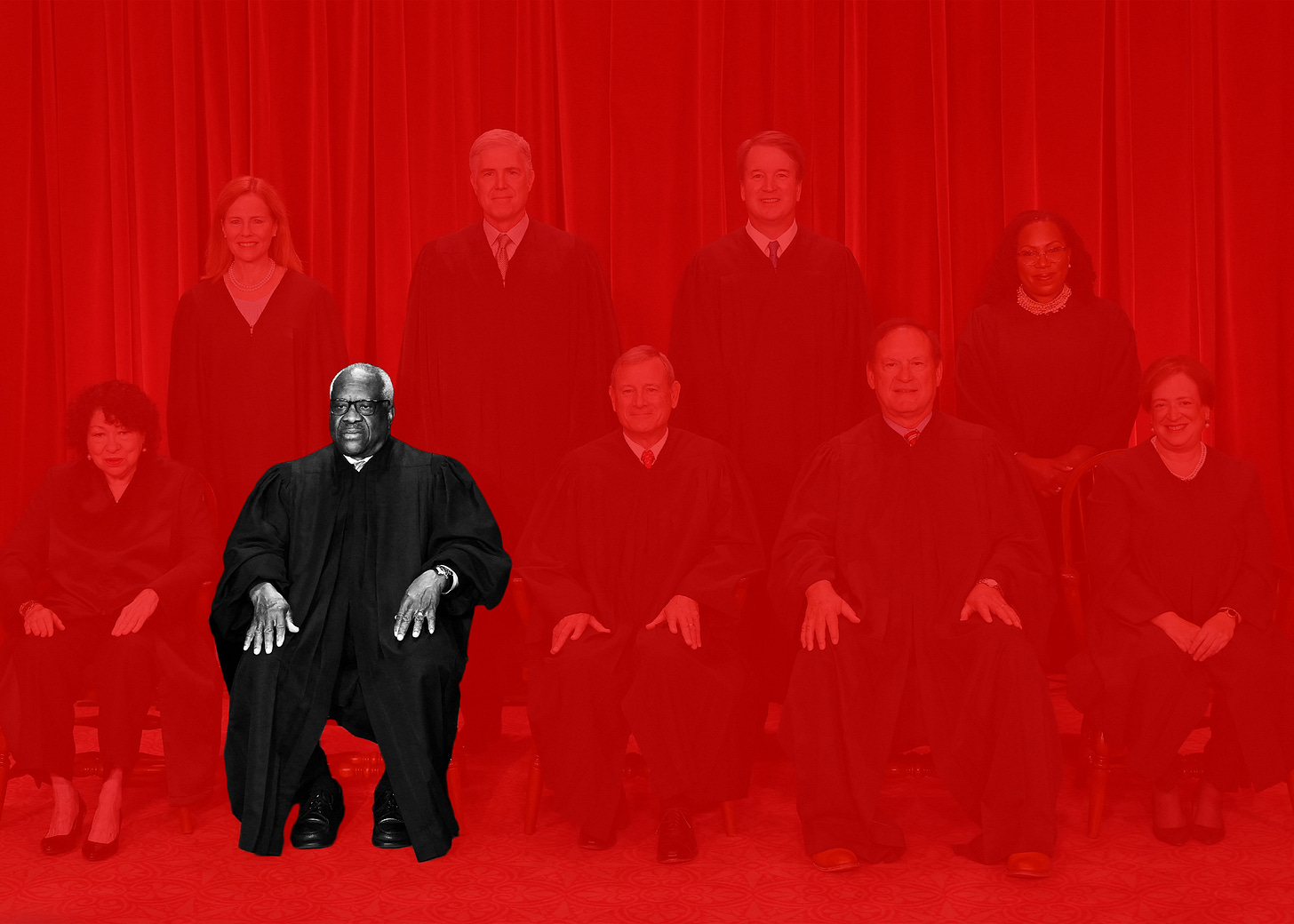Clarence Thomas Oopsies Again: Yet Another Trip He Failed to Report
Harlan Crow sent the Thomases to New Zealand back in 2010. The justice never reported it.
SURPRISE: SUPREME COURT JUSTICE CLARENCE THOMAS has failed yet again to disclose free private jet travel for him and his wife—in this case, a round-trip luxury flight between Hawaii and New Zealand that they took in 2010. Once again, it was gifted to him by Dallas billionaire Harlan Crow, most likely on his high-end Bombardier Global 5000 private jet.
The disclosure, reported in the New York Times and elsewhere on Monday, came via information that Senator Ron Wyden (D-Ore.) obtained from the U.S. Customs and Border Protection agency. Senator Wyden referred to it in a letter he sent Monday to Crow’s lawyers. It sought more information that they and Crow had failed to provide the Senate Finance Committee that Wyden chairs.
The Thomases seem to think they are immune from the usual force of political gravity. They clearly do not understand that less-than-full disclosure, whether on mandated government forms or to Congress, carries serious risk of giving legs to a scandal. It was just back in June that Thomas had to amend his Ethics in Government Act disclosure forms for 2019 to include a Crow-funded trip to Indonesia he had left off. At the time, Thomas called it an “inadvertent” omission.
Apparently, inadvertent lightning has struck the same place twice, since Thomas’s form for 2010 doesn’t mention the no-pay luxury trans-Pacific trip that year.
SO THE QUESTION ARISES: How many times does it take for an individual with a lifetime appointment to supreme judicial power properly to amend his disclosure forms? It might sound reminiscent of an old, cheap joke, but for those who care about the Ethics in Government Act, there’s nothing funny about it.
That 1978 law, enacted in the wake of the Watergate scandal, requires government officials to disclose gifts above a nominal amount and other potential conflicts of interest.
With Justice Thomas, who knows what other corrections might be required? It seems that the longer that journalists and congressional investigators keep digging, the more likely that they will uncover further previously undisclosed travel boondoggles gifted to Thomas. His June financial form amendment came in the wake of ProPublica’s bombshell articles last year about his having accepted free luxury travel and accommodations from Crow and not reporting them.
It’s a serious problem when one of the nation’s top judicial officials is apparently committed to something other than the whole truth and nothing but the truth.
THE SUPREME COURT WAS ALREADY on the ballot this November. Among the top reasons: the overturning of Roe v. Wade in June 2022 and the ruling last month in Trump v. United States granting presidents immunity for crimes committed while performing “official acts.”
Now Thomas’s newly reported ethics lapse reinforces the need for Court reform of the kind that President Biden proposed last week. Vice President Kamala Harris, the presumptive Democratic presidential nominee, quickly endorsed Biden’s plan. It includes legislation to impose on the Court an enforceable ethics code.
Of course, passing any reform package would require not only Kamala Harris’s election as president but also the election of Democratic majorities on both sides of Congress, whether next year or in the midterms that follow.
If that occurs, here’s some related experience that may suggest a serious prospect of accountability for Justice Thomas. I was a federal prosecutor. Except in the most egregious cases, we did not often recommend that a grand jury indict first-time white-collar suspects; it’s usually too hard to establish criminal intent. But I once had a defendant who burned down his lumber yard in New Jersey, moved to California, and did it again.
He would have gotten away with one arson. It was the second fire that burned him, so to speak. It got him not only indicted but also convicted.
Without suggesting that Thomas is at any real-world risk of being prosecuted—or convicted by a two-thirds supermajority of the Senate were he impeached—the failure to disclose material gifts by an excellent lawyer after a previous failure goes a long way to showing the omissions are not inadvertent. A provable belief that a justice was intentionally withholding from the public material information required by law to be given could powerfully motivate a responsible Congress to enact enforceable Supreme Court ethics reform.
Whatever animates Justice Thomas’s apparent disregard for the conflict-of-interest disclosure law that binds him, the man appears to be a serial ethics-in-government rule offender. He should have a parking boot affixed to his Supreme Court wheels.




